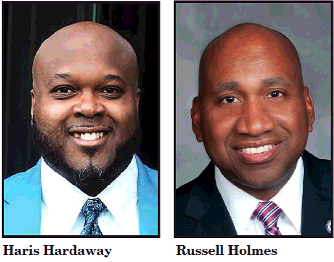June 10, 2022

For the first time in a decade, there will be a primary race this year for state representative in the 6th Suffolk District. Incumbent state Rep. Russell Holmes, running for a sixth term, will face challenger Haris Hardaway. Both men are Democrats.
Holmes, 52, first claimed the seat in 2010, beating out four other hopefuls to succeed Rep. Willie Mae Allen. In each of the next five elections, Holmes ran unchallenged for the seat, spanning parts of Dorchester, Hyde Park, Jamaica Plain, Mattapan, and Roslindale. Along with his state representative post, Holmes also works as a certified financial planner with Baystate Financial Services.
“It all goes back to governing from the community,” Holmes said in an interview last week. “What I bring to the seat is many conversations with community folks. It isn’t about me trying to accomplish anything on my own – not letting my own agenda drive what important, but letting hundreds and hundreds of conversations drive the agenda.”
Hardaway, 41, has called Talbot Avenue his home for more than a decade, though he lived all over the district in his younger years. After working with seniors for 17 years through Central Boston Elder Services and youths for 10 years through a step dance organization, Hardaway “segued into consultancy” more than five years ago as principal of HHH Strategic Consulting. His family also owns the Nubian Square business Final Touch Boutique.
Along with family, Hardaway co-founded the Morton Street Board of Commerce. He cited the organization’s work bringing street cleaning services to Morton Street Village and working to bring signage into the village district.
Over the past decade, Hardaway says, the neighborhoods have not seen enough money “trickle down.” He considered running for City Council last year, but “realized I would do better not on the council but at the state level. We need more vision toward what the district looks like,” he said.
In his years here, he added, he has seen the “vastness of district; the beauty of it. But what we need is not being put forth. The main thoroughfare and economic engine has not seen strong development in over 30 years.”
Hardaway highlighted transportation as a major area of focus. He wants to see the current investment into Blue Hill Avenue overseen competently, he said. He plans to push for new investment in electric vehicles and green energy for the district, which would be “efficient and effective for people who live there.”
Hardaway also emphasized the current state of the Boston Public Schools, which are being considered for state receivership.
“There are systems in place that aren’t seeing the right oversight,” he said. He expects that his experience in communications work as well as past internships on Beacon Hill and in DC would serve him well in fostering relationships as a representative. It’s a matter of “bringing people to the table and doing common sense work,” Hardaway said.
The 6th Suffolk is “far improved over the last twelve years but still has many more challenges to address,” said Holmes, who points to his work on the former State Hospital site in Mattapan, mostly crumbled foundation when he took office and now the site of existing and future housing.
The Brooke Charter School Mattapan is “up and running” with a new $1.5 million football field, with another $5 million proposed for additional athletic fields. Still in his sightline are the old Cote Ford site and finding a compromise around Hyde Park’s Crane Ledge proposal.
Holmess’ pitch is straightforward – look at his record on legislation, budget advocacy, and constituent services.
His work on police reform and criminal justice reform has been “generational” in impact, Holmes said, pointing to the Massachusetts Peace Officer Standards and Training (POST) Commission as an example.
In the time since he entered state government, Holmes said, the number of people in state and county prisons has roughly halved, in part due to the reforms he championed with and for his constituency. An equity lens is an essential part of his approach to education funding and evaluating new industries, he noted.
On education, he said, Massachusetts “cannot just say we’re number one. Who cares if my children are falling behind? We have to bring funding to the kids who need it most. If we’re going to bring cannabis into communities, we have to consider the social equity fund and people of color.”
Critically, he is looking for ways to address learning loss and small business struggles in Black and Brown communities brought about by the pandemic through tutoring programs and targeted funding.
Projects like No Books No Ball, institutions like the African Meeting House, and years of advocacy for local transportation improvements are indicative of his budget priorities, Holmes said.
The new Fairmount Line stations are completed, Holmes notes, but he is still pushing for electrification and service improvements to the commuter rail line. He is pushing for Blue Hill Avenue improvements to get state funding, but also calls on the city to “deliver” on fixes for Cummins Highway and American Legion.
As Holmes often remarks, “I’m not picky. I just want the best.”
Holmes, in an earlier interview, expressed “surprise” that Hardaway would primary him, adding that he has not seen his challenger at the “thousands” of community meetings Holmes has attended over the past 12 years.
“I listen to what people have to say and bring it to the State House,” he said. “I’ll put my record up against anyone for that.”


